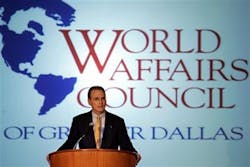American Airlines CEO Lobbies for Lower Fees, Taxes on Airlines
American Airlines, which temporarily cut flights from its daily schedule last week to save fuel, may ground those planes even longer and try harder to pass the rising cost of jet fuel on to consumers, Chief Executive Gerard Arpey said Thursday.
American's parent company, AMR Corp., expects to spend $5.75 billion on fuel this year _ a 45 percent increase on top of last year's 43 percent jump.
Arpey also praised a Senate bill that would give American and other airlines more time to make payments to their pension plans. He also struck a no-compromise stance on a 1979 law limiting long flights at Dallas Love Field.
Arpey made the comments to reporters after addressing a business group at an airport hotel near American's Fort Worth headquarters.
American and sister carrier American Eagle spent nearly $4 billion on fuel last year and expect to spend $5.75 billion this year. Fuel has jumped from 12.3 percent of American's operating expenses in 2002 to 21.1 percent in 2004 and will be even a larger chunk this year.
Despite the added cost, AMR turned a narrow profit in the second quarter, but analysts surveyed by Thomson Financial expect the company to lose about $570 million for the year.
The price of oil fell Thursday for the fifth consecutive day to a 2-month low, and that helped airline stocks. Shares of AMR rose 85 cents or 7.4 percent, to close at $12.41 on the New York Stock Exchange.
On Sept. 30, American cited high fuel costs in announcing it was temporarily cutting 15 flights through Oct. 29 at its two biggest hubs, DFW and Chicago's O'Hare International Airport. American operates about 1,900 daily flights.
Arpey warned, however, that the flight cuts could be extended into November and December. "We'll have to see what the price of oil does," he said.
While the price of oil remained above $60 a barrel, airlines have paid even a steeper price because the spread between the price of oil and the cost of jet fuel has expanded to record levels. Arpey said American was paying the equivalent of $130 per barrel for jet fuel this week.
"We are going to have to, as an industry, figure out how to take that commodity cost and pass it on to our customers, which we've been unable to do thus far," he said.
The nation's carriers have raised fares several times this year and added fuel surcharges for passengers and cargo shipments. Arpey said the increases haven't offset the run-up in fuel costs.
"Just to cover the increase in fuel costs between 2003 and 2005, American would have had to raise fares nearly $75 per roundtrip ticket," he said. "Unfortunately, during this time period our average fare increased only $15."
Arpey repeated earlier calls for the government to cut fees and taxes levied on airlines, although some of those fees are added directly to travelers' fares.
He said he was pleased that key senators have agreed to add American and Houston-based Continental Airlines Inc. to a bill that would give Delta Air Lines Inc. and Northwest Airlines Corp. 14 years to make pension payments due over the next few years.
Delta and Northwest filed for bankruptcy protection on Sept. 14, but American and Continental objected that it would be unfair to grant pension relief only to bankrupt carriers.
News stories provided by third parties are not edited by "Site Publication" staff. For suggestions and comments, please click the Contact link at the bottom of this page.

